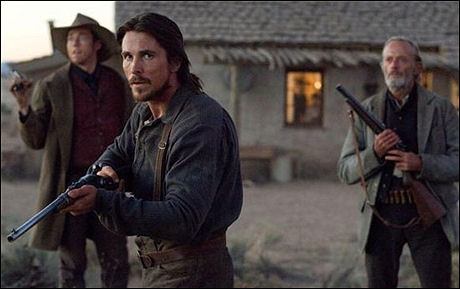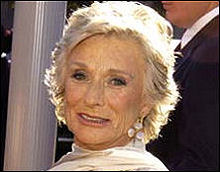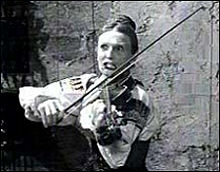Torture porn and the general gross-out horror flicks are running out of steam, but does that mean people are cool to any kind of scary movie, even an upscale, quality-level gothic horror flick like 1408? It’s tracking at 56 general awareness, 30 definite interest and 9 first choice — not bad but not a volcano either. The definitely-not-interested percentage is 12, which obviously indicates a turn-off element.
Paramount Vantage’s A Mighty Heart is only at 44, 22 and 6. There seems to be a feeling out there that people aren’t interested in anything Middle East-y or 9.11-ish. (Damn milquetoasts, ostriches, too-sooners.) This is Michael Winterbottom‘s best film ever in that it doesn’t seem to have been directed by him but by Michael Mann.
The reviews have been good-respectable-decent, but not that many critics have been saying “drop everything and see it.” Plus it’s being said that Angelina Jolie is “not that big a star, and never has been,” a guy says. Whatever that means. The knee-jerkers are going all “meh”? Jolie is a major name and (take this to the bank) she gives a first-rate performance here.
For a movie that cost more than $200 million (is it higher?), Evan Almighty‘s tracking isn’t looking all that great…89, 40 and 15. It appears fated to take in $25 million by Sunday night — that’s not big enough for a big-studio (i.e., Universal), super-sized gamble movie.
Live Free Die Hard (20th Century Fox, opening Wednesday, 6.27), the slam-bang Bruce Willis action tentpoler, is at 92, 36 and 5 — decent opening (maybe a better-than-decent one) but not through the roof….yet.
Dull-as-dishwater Evening (opening 6.29) is at 22, 2 and 1…forget it.
Disney/Pixar’s Ratatouille (6.29) is going to be huge. Word-of-mouth is soaring, and it wisely snuck last weekend across the country. It’s now at 78, 36 and 7…definitely on track to be the #1 picture that weekend.
Sicko (6,29) is at 38, 22 and 3. And yet 22 % are saying “definitely not interested.” Neg-heads, cynics, rightwingers, ostriches. “A lot of the country doesn’t want to see Michael Moore,” a friend told me. Except Sicko is a major eye-opener, it delivers basic real-world truths and (trust me) it makes you choke up at the end.
License to Wed (opening 7.3), the supposedly atrocious Robin Williams comedy, is at 69, 22 and 2.
Michael Bay‘s Transformers (7.3) is at 87, 41 and 12…good but not yet sensational. It has time to build so we’ll see what’s doing next week. Obviously has the highest definite-interest and first-choice numbers.
Friday’s openers
Five films opening this weekend (6.22 to 6.24) are, quality-wise, exceptional. It’s almost irritating that they’re bunched into a single weekend because one or more is sure to suffer from the competition, especially given the wrist-slitting likelihood that Tom Shadyac‘s allegedly lame-o Evan Almighty (Universal, 6.22) is going to get the crowds and make the most money.
I’ve seen three of the five goodies opening this weekend — Mikael Hafstrom‘s 1408, Michael Winterbottom‘s A Mighty Heart and Zoe Cassevetes‘ Broken English. (Click on titles for links to HE reactions.)
I can’t say anything definitive (let alone personal) about Jon Dahl‘s You Kill Me or Black Sheep (seeing them both within the next couple of days) but their respective Rotten Tomatoes ratings — 100% and 85% — are obviously encouraging.
Why couldn’t one or two of these five have opened last weekend, which was fairly dead by the standards of anyone with taste or a brain? What persons of consequence gave a shit about seeing Fantastic Four: Rise of the Silver Surfer?
“Sicko” pirating continues
The Sicko pirating is spreading further…good God. Last week stolen Sicko‘s were being offered on priatebay.org and BitTorrent.com. (The pirate monikers were reported by Newsweek in this week’s issue.) And now the Hollywood Reporter‘s Gregg Goldstein informs that viewers “could find it easily on YouTube this weekend.”
The 124 minute health-care doc (Weinstein/Lionsgate, 6.29) was “posted by at least two users in 14 consecutive video chunks,” with one version receving “500 to 600 views per segment, with one of the first segments garnering nearly 1,700 views” and “another version uploaded Saturday garnering 200-300 views per segment, with the first 10 minutes getting more than 1,200 views.”
When Goldstein asked for an official comment from late Sunday, a Weinstein Co. spokesperson “was unaware that the entire film was on YouTube,” he reports. “A Lionsgate executive and a YouTube spokesperson did not respond to a request for comment.”
Check out Moore’s 6.17.07 visit to Late Night with David Letterman.
Lane on Jolie, Pitt
“Official estimates as to how many children Angelina Jolie now possesses, and from how many continents, change on a weekly basis. When not giving birth herself, she likes to order in. How this has affected Brad Pitt is unclear, but his expression is sometimes that of a man who stepped out to hail a cab and got run over by a fleet of trucks.” — from Anthony Lane‘s New Yorker review of A Mighty Heart.
Affluent addictions
“Experts say that the more permissive attitude of high-end residential rehab programs is primarily a reflection of the demands of a new generation of affluent addicts, more pampered and less inclined to endure the tough-minded approach of the past. There is also a recognition that four decades or so of the A.A.-based approach have produced only the slimmest evidence of success.” — from Sharon Waxman‘s N.Y. Times piece about cushy rehab facilities and their dicey efectiveness.
If you’re addicted to something and you’re 90% committed to getting rid of it (no one is 100% committed to this — there’s always that 10% doubt-and-weakness factor), my experience is that it takes about four or five tries. Sometimes two or three, sometimes a lot more. Everyone fails, stumbles, relapses. Dealing with addictive tendencies is a never-ending struggle…one day at a time.
Seattle panel discussion
Variety‘s Anne Thompson led a discussion yesterday at the Seattle Film Festival about the migration of film criticism to the web, but she hadn’t included a report on her blog as of 2:20 pm Pacific. Amazon.com essayist Tim Appelo also took part. I asked Appelo to send me a recording of the discussion, but he wrote me today to inform that “the recorder died so there’s no record of the event.”
Appelo had asked me to tap out a thought or two about the topic at hand, which I sent to him yesterday morning. He says he read it “to the panel audience in stentorian tones and it was a hit.” It’s no big deal, but here’s what I sent:
“Any film critic who’s not writing directly for an online audience, or at least is putting his/her stuff online so the under-35s can read and react, is writing his or her own obituary. Print is dying, collapsing, downsizing. The old models and old configurations don’t work any more, and even the most old-school media reactionaries are admitting this.
“That said, I am sentimentally distraught at the prospect of newspapers like the New York Times or the San Francisco Chronicle or the Boston Pheonix not being as available for a good, mid-morning read at some cool-ass cafe in Manhattan, San Francisco or Boston. An all-cyber, all-the-time world is not comforting to me. But we are in the middle of a revolution, and, as we all know, revolutions can be brutal and unkind.”
3:10 to Yuma trailer
Here’s a trailer for James Mangold‘s 3:10 to Yuma, the Russell Crowe-Christian Bale western.that’s said to be very solid in a back-to-basics, character-driven sort of way. Lionsgate is tentatively planning to release it on October 5. That will make it the first Crowe pic of the season, the other being Ridley Scott‘s American Gangster, due to open on 11.2.07.

Mangold is a first-rate director. If anyone can re-resuscitate the western….well, it may be un-resuscitable as a genre but I’ve been told that Yuma is extremely sturdy and well-crafted.
My only problem, looking at the trailer, is with Bale, who looks excessively greasy and scuzzy — too much so in my book. I mean, he’s supposed to be the good guy and he looks like a lowly cowhand at best, and a derelict at worst. We live in a post-modern world with no hard moral boundaries, which means that secondary character-definers are everything — conviction, personality, attitude, personal hygeine.
And to me, Crowe — the Yuma bad guy — seems much calmer, cooler and more collected than Bale, who not only looks anxious and uncertain, but looks like he’s taken a daily bath in chicken grease. Crowe looks rugged but with a low (bordering on non-existent) chicken-grease factor.
I’m not trying to be a jerk, but I have a problem with anyone who looks too sweaty or scuzzy in a film. I think most of us feel the same way. I can’t get behind a supposed hero who has yellow or missing teeth or whose hair appears overly germ-infested or anything along these lines (i.e., long ear hair strands, long chunky Nosferatu-style toenails, beetle-size zits and blackheads). A western hero can look scruffy like Kevin Costner in Open Range or Clint Eastwood in Unforgiven, but if he’s too chicken-greasy the whole contract goes out the window.
Mangold recently told Total Film mag that Yuma‘s final gunfight is “a wild ride, but an analogue wild ride. We left our computers at home. It’s gritty and intense and handheld.”
Let Leachman die on stage
Mel Brooks, 80, is alive and well, but he’s dead wrong to have told Cloris Leachman, 81, that she’s too old to play “Frau Blucher” in the Broadway stage musical version of Young Frankenstein, which will open next November.


Cloris Leachman now (r.); as Frau Blucher (l.)
Brooks’ spokesperson said in a statement that Leachman “was a very funny and game Frau Blucher in our reading, but in the end producers thought the physical demands of doing eight performances a week were too much to ask of her.” Brooks would do well to show a little heart and respect for a trouper. If Leachman dies from the strain of doing eight shows a week, she dies proudly. Better to burn out than to fade away. Blucher!
Finke named Entertainment Journalist of the Year
Congratulations to Deadline Hollywood Daily‘s Nikki Finke for being named “Entertainment Journalist of the Year” last night at an L.A. Press Club awards event at L.A.’s Biltmore hotel. The award was technically for Finke’s L.A. Weekly column, but how could they not take her blog into account?
“Finke’s salaciously candid coverage of Hollywood and its inhabitants almost feels like a guilty pleasure,” the judges said. “She mixes the news with fearless finger-wagging that’s just fun to read no matter the subject. She tackles the industry monoliths without the kiddy gloves and she seems to have command of the beat.”
L.A. TImes columnist Patrick Goldstein was named 1st runner-up in this category; the second runner-up was L.A. Times music-industry columnist Ann Powers. Finke was alsogiven a second-place award Friday by the AltWeekly Awards group.
The L.A. Press Club board members are not, I’m told, the panel of judges who selected the winners and runners-up in each category. It wouldn’t work otherwise because “entertainment historian” Alex Ben Block is listed as an LAPC board member and yet he was also given an LAPC SoCal Journalism Award for “Online Entertainment News/Feature/ Commentary” for a HollywoodToday.net piece called “Rocky Underdog Origin: A Studio Myth.”
Finke says “my understanding from my own newspaper is that the club itself does not judge the entries…I was told they send out the entries to another major press club who judges it.” I asked LAPC president Anthea Raymond to explain the voting process more thoroughly, but she didn’t respond. Maybe she’s one of those journalists who believe in taking Sundays off.
Curran and Nichols on Catch 22″
Painted Veil director John Curran says he greatly admires and was deeply influenced when young by Mike Nichols‘ Catch 22. I admire it also (mainly for the elaborate and carefully planned choreography that went into the cinematography, and for Richard Sylbert‘s production design) but with reservations — reservations that are not minor in nature.
For Curran to ignore the problems with Catch 22 in a piece like this is…well, curious. At the very least he’s guilty of tunnel vision. Nichols himself has had problems with this film all his life, and he admits to most of them in his DVD audio-track discussion of the film with Steven Soderbergh.
Nichols speaks at one point about how Catch 22 has very little in the way of unspoken undercurrents or, as he puts it, “the things that [characters] do not say” which are often what films are finally about.
Sylvia Kristel looks back
A fairly interesting, nicely written interview with onetime soft-porn star Sylvia Kristel by the Telegraph‘s Mick Brown. Kristel spoke to Brown in order to publicize her tell-all book called “Undressing Emmanuelle” (which I couldn’t find on Amazon).
Posey speaks to Olsen
“There’s no precious preciousness to it. I like getting involved [and saying] I’ll take care of it.’ It comes from independent film. I got used to it — there’s tape on the floor, you pick it up. It’s just an awareness you have, like peripheral vision when you’re rollerblading in traffic. It comes from being on a lot of sets.” — Broken English star Parker Posey speaking to L.A. Times reporter Mark Olsen.


